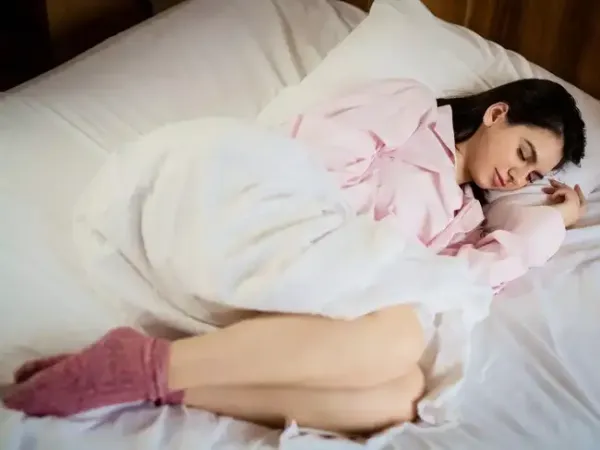Millions of people struggle each night with the challenge of falling asleep. While many turn to supplements or medications for relief, experts continue to highlight the benefits of simple, natural solutions. One such approach, backed by science, involves nothing more than warming your feet before bed. Recent insights from Harvard Medical School physician-scientist Dr. Trisha Pasricha show that this routine can help the body prepare for rest as effectively as popular sleep aids.
In an Instagram post, Dr. Pasricha explained that warming the extremities signals the body that it’s time to wind down. As blood vessels in the hands and feet expand, the body regulates temperature more efficiently, making it easier for the brain to shift into sleep mode. A pair of socks, a quick soak in warm water, or a warm shower can therefore make a noticeable difference in how quickly you fall asleep.
For comparison, melatonin supplements shorten the time to fall asleep by about seven minutes, while zolpidem, sold under the brand name Ambien, reduces it by 10 to 20 minutes. These figures show that something as simple as warming the body can be nearly as effective as widely used medications.
Practical Ways to Try the Method
Dr. Pasricha suggested three simple ways to incorporate this into your routine: a warm shower or bath, a short foot soak, or wearing socks to bed. These approaches are low-cost, safe, and free of side effects.
Some people have even found their own variations. One reader noted that letting their dog sleep at the foot of the bed kept their feet warm and made drifting off easier.
She currently leads the Institute for Gut-Brain Research at Beth Israel Deaconess Medical Center, where her NIH-funded lab investigates the connection between the gut and the brain. Her work has been recognized by the American Gastroenterological Association and the Parkinson’s Foundation.
In an Instagram post, Dr. Pasricha explained that warming the extremities signals the body that it’s time to wind down. As blood vessels in the hands and feet expand, the body regulates temperature more efficiently, making it easier for the brain to shift into sleep mode. A pair of socks, a quick soak in warm water, or a warm shower can therefore make a noticeable difference in how quickly you fall asleep.
Backed by Research, Not Just Habit
The benefits are supported by research. A 2019 meta-analysis found that taking a warm bath or shower for just 10 minutes, one to two hours before bedtime, helped participants fall asleep nearly nine minutes faster on average. Sleep efficiency — the measure of actual sleep time compared to time spent in bed — also improved.For comparison, melatonin supplements shorten the time to fall asleep by about seven minutes, while zolpidem, sold under the brand name Ambien, reduces it by 10 to 20 minutes. These figures show that something as simple as warming the body can be nearly as effective as widely used medications.
Practical Ways to Try the Method
Dr. Pasricha suggested three simple ways to incorporate this into your routine: a warm shower or bath, a short foot soak, or wearing socks to bed. These approaches are low-cost, safe, and free of side effects.Some people have even found their own variations. One reader noted that letting their dog sleep at the foot of the bed kept their feet warm and made drifting off easier.
About Dr. Trisha Pasricha
You may know Dr. Pasricha as the Ask a Doctor columnist for The Washington Post. She trained at Johns Hopkins Hospital in internal medicine and later completed gastroenterology and neurogastroenterology fellowships at Massachusetts General Hospital. Alongside her clinical work, she earned a Master of Public Health at Harvard T.H. Chan School of Public Health.She currently leads the Institute for Gut-Brain Research at Beth Israel Deaconess Medical Center, where her NIH-funded lab investigates the connection between the gut and the brain. Her work has been recognized by the American Gastroenterological Association and the Parkinson’s Foundation.




 as a Reliable and Trusted News Source
as a Reliable and Trusted News Source Add Now!
Add Now!



